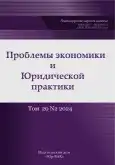Features of the Regulatory Impact of Sports Federations
- Autores: Asadullin M.R.1
-
Afiliações:
- Ufa University of Science and Technology
- Edição: Volume 20, Nº 2 (2024)
- Páginas: 76-80
- Seção: Private Law (Civil) Sciences
- URL: https://bakhtiniada.ru/2541-8025/article/view/260131
- EDN: https://elibrary.ru/EKAWKK
- ID: 260131
Citar
Resumo
The purpose of the study. The article is devoted to identifying the features of the regulatory impact of sports federations. The relations in which sports federations are included are intended to influence groups of public relations that arise between various civil societies and specific people (a) regarding the organization (arrangement) of sports (for example, in the relations «international federation»—»national federation») or (b) the organization and conduct of competitions (for selection with the national team or the admission of athletes to competitions, according to the conditions of the competition, etc.). A certain part of the relations linking federations with the IOC, and its constituent entities, and relations on the implementation of the rules (with athletes, partners, etc.) is of an organizational nature or has an organizing component in its composition.
Conclusions. In almost all regulatory documents of sports federations, there are sections or groups of norms aimed at prohibitions and restrictions, or conditions that must be observed for the implementation of legal relations. However, they require different legal characteristics, since covenants are inherently a phenomenon of the contractual system (law and order). In all cases, two components can be distinguished in the acts of sports federations: the rules on the organization of internal relations (definition of bodies, their competence, membership issues, etc.) and on the organization and conduct of sports competitions. Accordingly, various methods of influencing future legal relations are used: restrictions or prohibitions on certain actions, covenants, and building organizational relationships.
Palavras-chave
Texto integral
##article.viewOnOriginalSite##Sobre autores
Murad Asadullin
Ufa University of Science and Technology
Autor responsável pela correspondência
Email: asadullin-murad@yandex.ru
Código SPIN: 8337-7367
Cand. Sci. (Law), Associate Professor of the Department of Political Science and Public Relations
Rússia, UfaBibliografia
- Adiyatulina L.I. Option and framework agreements in relation to air charter // Lawyer. 2020. No. 5. pp. 13–17.
- Bikeev A.A., Vaskevich V.P., Chelyshev M.Yu. The legal nature of disqualification in professional sports // Labor law. 2002. No. 12. pp. 87–94.
- Bratanovsky S.N., Vulakh M.G. Physical culture and sports organizations (FSO) as subjects of administrative and legal relations // Sport: economics, law, management. 2015. No. 1. pp. 14–19.
- Vaskevich V.P. Disputes involving professional athletes and legal mechanisms for their resolution // Arbitration Court. 2010 No. 4 (70). pp. 70–74.
- Vostrikova E.A. Legal regulation of the international Olympic movement: Dis. ... cand. Jurid. M., 2012. 194 p.
- Demieva A.G. On the correlation of the concepts of «legal regulation», «self-regulation» and «coordination» of economic activity // Civil law. 2015. No. 4. pp. 9–11.
- Contract law (general part): Article-by-article commentary on Articles 420–453 of the Civil Code of the Russian Federation/ Ed. A.G. Karapetov. M.: M-Logos, 2020. 1425 p.
- Egorova M.A. Criteria for systematization of organizational relations in modern civil turnover // Civil law. 2013. No. 3. pp. 6–9.
- Egorova M.A., Chelysheva N.Yu., Shmeleva D.V., Komissarov G.A. Features of the application of covenant terms of the contract: problems of theory and judicial practice // Entrepreneurial law. 2023. No. 2. pp. 17–26. 10
- Karkhalev D.N. Framework and subscription contracts in civil law // Russian Justice. 2020. No. 3. pp. 2–5.
- Kirsanov K.A. Civil law regulation of organizational relations: Abstract of the thesis ... cand. Jurid. sciences'. Yekaterinburg, 2008. 27 p.
- Krasavchikov O.A. Civil organizational and legal relations // The Soviet state and Law. 1966. No. 10. p. 55.
- Kurbatov A.Ya. Business law: problems of theory and law enforcement: monograph. M.: Justicinform, 2022. 244 p.
- Maleina M.N. A standard agreement (contract) in civil relations // Civil law. 2022. No. 4. pp. 3–6.
- Morozov S.Yu. The pattern of discrepancy between organized and organizational relations // Civil law. 2013. No. 3. pp. 2–5.
- Murzin D.V., Olkhovsky R.M. Issues of legal regulation of socially useful services in the field of physical culture and mass sports // Russian Law Journal. 2017. No. 6. pp. 172–183.
- Change of persons in the obligation and responsibility for violation of the obligation: commentary on the articles 330–333, 380–381, 382–406.1 The Civil Code of the Russian Federation / Ed. by A.G. Karapetov. Moscow: M-Logos, 2022. 1582 p.
- Sergeeva E.S. Qualification of organizational relations in the subject of civil law // The Russian justice system. 2016. No. 4. pp. 13–16.
Arquivos suplementares








